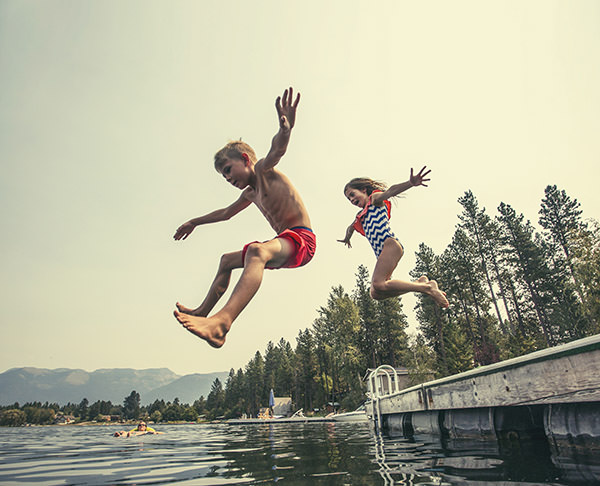Keep Calm and Swim On
James Whitcomb Riley (a Hoosier poet, btw) waxed eloquently about "the ole swimmin' hole" of his youth. His ole swimmin' hole might be long gone, but one thing that never changes; kids love to swim, and the best thing about summer is heading to the nearest pool, lake, river or ocean and getting back to our beginnings - the water.
Diving off terra firma into the big blue is exhilarating, its freeing, its refreshing, its exciting; no wonder kids love it so much! But whether you take your little tadpoles to the pool or to the beach, one thing is true across the board; you have to practice water safety.

The Red Cross has a list of safety tips to ensure that this summer is all about fun and nothing else.
Without question, one of the best things you can do is to keep your kids safe by enrolling them in age appropriate swimming lessons. It's never too early to capitalize on their natural affinity to the water to teach them to swim.
And then follow these rules whenever you are on, in or around the water in any form.
- Swim in designated areas supervised by lifeguards.
- Always swim with a buddy; do not allow anyone to swim alone. Even at a public pool or a lifeguarded beach, use the buddy system!
- Ensure that everyone in the family learns to swim well. Enroll in age-appropriate Red Cross water orientation and Learn-to-Swim courses.
- Never leave a young child unattended near water and do not trust a child’s life to another child ; teach children to always ask permission to go near water.
- Have young children or inexperienced swimmers wear U.S. Coast Guard-approved life jackets around water, but do not rely on life jackets alone.
- Establish rules for your family and enforce them without fail . For example, set limits based on each person’s ability, do not let anyone play around drains and suction fittings, and do not allow swimmers to hyperventilate before swimming under water or have breath-holding contests.
- Even if you do not plan on swimming, be cautious around natural bodies of water including ocean shoreline, rivers and lakes. Cold temperatures, currents and underwater hazards can make a fall into these bodies of water dangerous.
- If you go boating, wear a life jacket! Most boating fatalities occur from drowning.
- Avoid alcohol use. Alcohol impairs judgment, balance and coordination; affects swimming and diving skills; and reduces the body’s ability to stay warm.
Prevent Unsupervised Access to the Water
- Install and use barriers around your home pool or hot tub . Safety covers and pool alarms should be added as additional layers of protection.
- Ensure that pool barriers enclose the entire pool area, are at least 4-feet high with gates that are self-closing, self-latching and open outward, and away from the pool. The latch should be high enough to be out of a small child’s reach.
- If you have an above-ground or inflatable pool, remove access ladders and secure the safety cover whenever the pool is not in use.
- Remove any structures that provide access to the pool, such as outdoor furniture, climbable trees, decorative walls and playground equipment.
- Keep toys that are not in use away from the pool and out of sight. Toys can attract young children to the pool.
Maintain Constant Supervision
- Actively supervise kids whenever around the water—even if lifeguards are present. Do not just drop your kids off at the public pool or leave them at the beach—designate a responsible adult to supervise.
- Always stay within arm’s reach of young children and avoid distractions when supervising children around water.
Know What to Do in an Emergency. If a child is missing, check the water first. Seconds count in preventing death or disability.
- Know how and when to call 911 or the local emergency number.
- If you own a home pool or hot tub, have appropriate equipment, such as reaching or throwing equipment, a cell phone, life jackets and a first aid kit.
- Enroll in Red Cross home pool safety, water safety, first aid and CPR/AED courses to learn how to prevent and respond to emergencies.
And, to close, few words of JW Riley for your reading pleasure...
"Oh! the old swimmin'-hole! In the long, lazy days
When the humdrum of school made so many run-a-ways,
How plesant was the jurney down the old dusty lane,
Whare the tracks of our bare feet was all printed so plane
You could tell by the dent of the heel and the sole
They was lots o' fun on hands at the old swimmin'-hole."
(Don't hold his spelling against us Hoosiers; it's called dialect. And that came across the river from Kentucky. ;-))
http://www.redcross.org/get-help/how-to-prepare-for-emergencies/types-of-emergencies/water-safety
Join the Discussion:
Comments
No posts found
